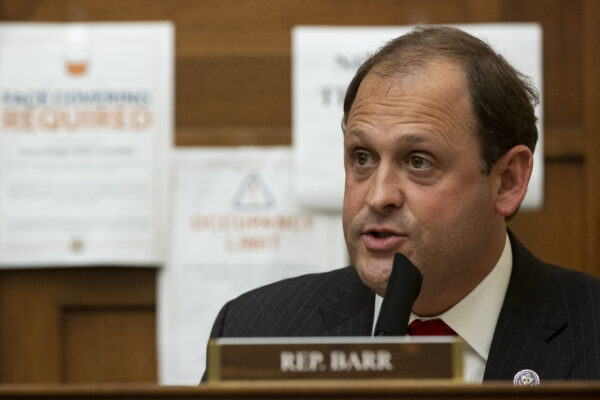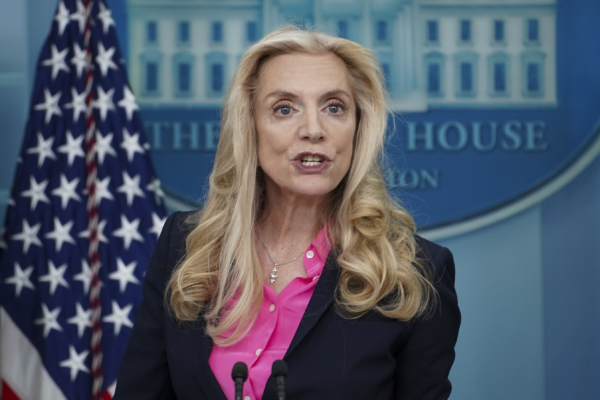Federal Reserve Not a Climate Policymaker, Says Central Bank Supervisor
Despite the Federal Reserve’s supervisory work related to the financial risks of climate change, the U.S. central bank is not a climate policymaker, says a supervisory and regulatory director at the institution.
Dr. Michael Gibson reiterated Chair Jerome Powell’s remarks earlier this year that the Fed is not crafting climate policy. However, the central bank is working to better understand climate change risks that challenge the financial system’s stability.
“Our primary focus is to evaluate whether banks operate in a safe and sound manner and manage all material risks, including climate-related financial risks,” Dr. Gibson told the House Subcommittee on Financial Institutions and Monetary Policy on July 18.
He highlighted that the Fed agrees that public policy proposals addressing climate change should be reserved for elected branches of government, adding that the central bank is not discouraging banks from providing accounts or services to any business.
But Rep. Andy Barr (R-Ky.) is concerned that politics could creep into the organization’s climate work, citing the central banks and supervisors’ Network for Greening the Financial System (NGFS) as an example. This group, founded in December 2017, attempts to bolster the scaling of green finance and put together a package of recommendations for central banks’ role in climate change.
In December 2020, the Federal Reserve joined 83 other central banks at the NGFS, supporting “the efforts of the NGFS to identify key issues and potential solutions for the climate-related challenges most relevant to central banks and supervisory authorities.”

But while Dr. Gibson told lawmakers on Capitol Hill that there was nothing nefarious about the Fed’s participation in the NGFS, Rep. Barr noted that “members of Congress and the American people are very concerned about the extraterritorial reach.”
“What we’re worried about is where this is going to have an international body, influencing regulators to pressure financial institutions, maybe not now, but eventually to force them into credit allocation,” Rep. Barr said.
“The Federal Reserve has a duty to understand the risks to the safety and soundness of the financial system, including the financial risks from climate,” Dr. Gibson said.
The Fed and Climate Change
At a symposium on central bank independence in Sweden in January, Chair Powell asserted that the Fed is “not, and will not be, a ‘climate policymaker.’”
In his semiannual Monetary Policy Report to the House Financial Services Committee in March, he insisted that the Fed will stick to its knitting.
“We are not looking to move into an area where we’re actually becoming a climate policymaker,” Chair Powell said. “I would completely agree with you that, over time, that border needs to be very carefully guarded.”
Other Fed officials have also rejected suggestions that the institution is embarking upon climate change policymaking. Fed governor Christopher Waller told a May conference in Spain that climate change does not pose “a serious risk to the safety and soundness of large banks or the financial stability of the United States.”
However, there is consternation among a chorus of Republican lawmakers that the Federal Reserve is gradually beginning to expand its mandate to include the environment.
In a May 17 letter to Chair Powell, a coalition of Senate Republicans highlighted that the central bank is inserting ESG (environmental, social, and governance) principles into risk analysis in the banking system, citing the climate stress test.
Dr. Gibson noted that the Fed’s Climate Scenario Analysis (CSA), which was officially announced in January after a three-year study, is different from the bank stress test.
The former determines the physical and transition risks from climate change on specific assets in six large banks’ portfolios. But the bank stress, Dr. Gibson stated, determines if financial entities possess enough capital to maintain lending to businesses and households during recessions and financial shocks.
“The pilot climate scenario analysis exercise, on the other hand, is exploratory in nature and does not have consequences for bank capital or supervisory,” he said during the hearing.
The CSA results from the six companies—Bank of America, Citigroup, Goldman Sachs, JPMorgan Chase, Morgan Stanley, and Wells Fargo—are expected to be released sometime this month.
Meanwhile, in 2019, then-Fed governor Lael Brainard argued that climate change must be incorporated into the Fed’s monetary policymaking.

“Increasingly, it will be important for the Federal Reserve to take into account the effects of climate change and associated policies in setting monetary policy to achieve our objectives of maximum employment and price stability,” said Ms. Brainard, who now serves as the director of the National Economic Council (NEC) in the current administration, in prepared remarks at a Federal Reserve Bank of San Francisco conference.
Michael S. Barr, the Fed vice chair for supervision, purported this year that the Fed “has narrow, but important, responsibilities regarding climate-related financial risks.”
On the legislative side, progressive lawmakers have proposed forcing the Fed to break up banks if they do not decrease carbon emissions they finance in line with the Paris climate accord.
In September 2021, a trio of lawmaker—Rep. Mondaire Jones (D-Ny.), Rep. Ayanna Pressley (D-Mass.), and Rep. Rashida Tlaib (D-Mich.)—put forth a bill titled the Fossil Free Finance Act. It did not come out of committee.




